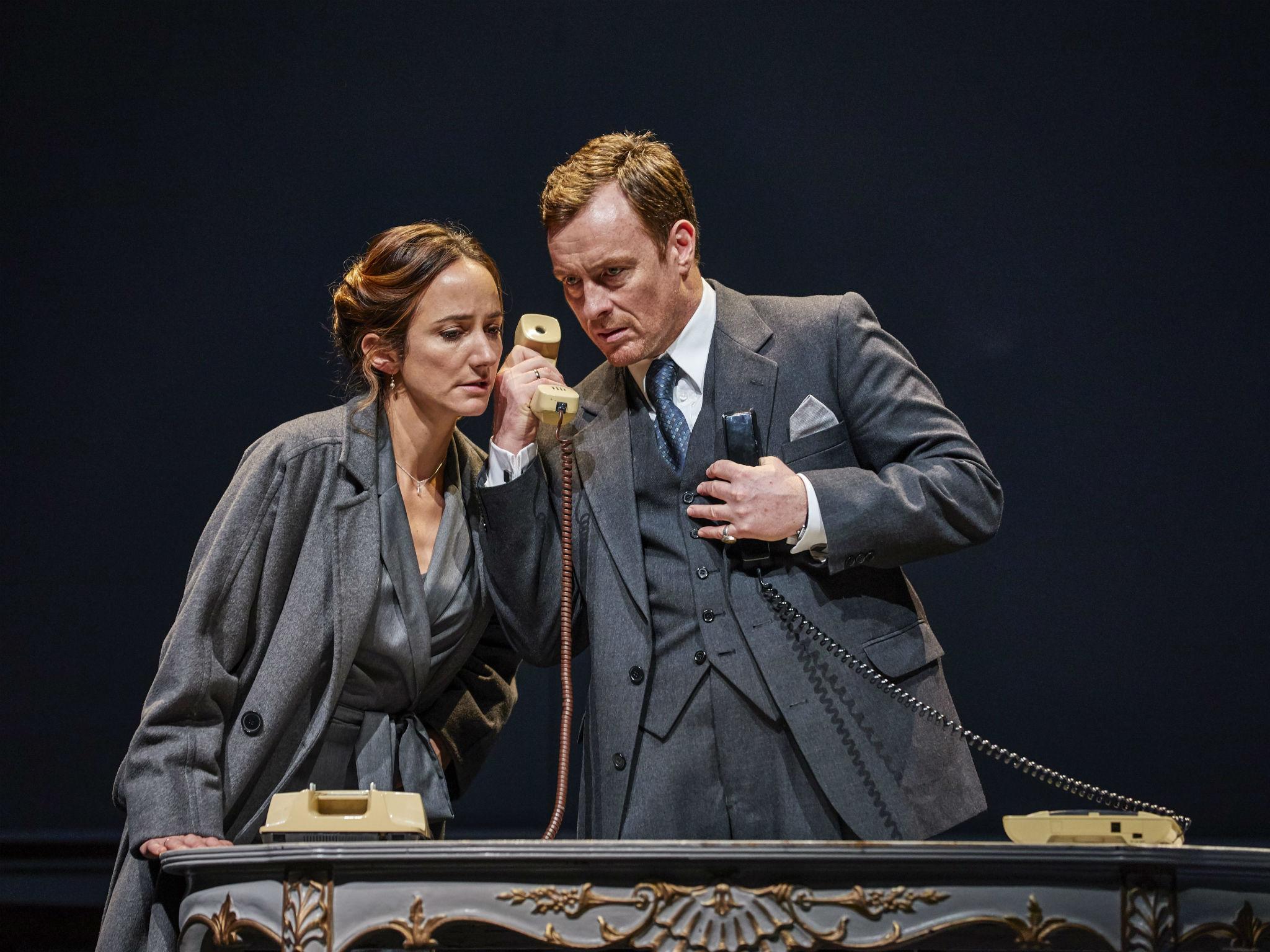Oslo, National Theatre, London, review: There is a Byzantine complexity that gives the show the grip of an intellectual thriller
Bartlett Sher's fast-paced and quick-witted staging of JT Rogers's new play is so much more than a slog through three hours of argument about the Middle East

JT Rogers occupies the role of chief foreign correspondent amongst American dramatists. His gifted plays have focused on the Rwandan genocide in The Overwhelming (2006) and the wars in Afghanistan in Blood and Gifts (2010). He won this year’s Tony award for his latest work, Oslo, which pulls you into the nine stressful months of secret negotiations that led to signing of the Oslo Accords and the historic handshake between Israeli Prime Minister Yitzhak Rabin and PLO leader Yasser Arafat, in the Rose Garden of the White House in September 1993.
If you imagine that three hours of dense, tortuous argument about the Middle East might be a bit of the slog, then you are not up to speed with the nature of this experience. Oslo is a marvel of theatrical dexterity and nimble exposition – both in the writing and in Bartlett Sher’s fast-paced and quick-witted staging, brought here from New York’s Lincoln Centre. It’s been recast with first-rate English actors and, after its short sold-out run at the National, the production will transfer to the Harold Pinter Theatre, where it will play from the start of October to the end of year.
Part of the charm of the show is the improbability of its fascinating story. The use of back-channel diplomacy was the initiative of two maverick Norwegians – Terje Rod-Larsen, director of the Fafo Institute for Applied Social Sciences and his wife, Mona Juul, who was then an official in the Norwegian Foreign Ministry. Terje was keen to apply his theory of “gradualism” to the ailing peace process. The idea is that if you remove implacable enemies from their normal negotiating contexts and provide with them a retreat where they can break bread, get to know one another as individuals and resolve one issue at a time, there may be a way forward.
Hence the remote manor house in the middle of a forest 30 miles outside Oslo where the covert meetings take place (the imposing set of a grey-walled classical anteroom is by Michael Yeargan). The opponents are bravely risking their own lives in being here. It is, for example, illegal for an Israeli official to speak to the PLO. The play instils a strong sense of the vital need for secrecy – not least from the Americans who are sponsoring official talks that are getting nowhere (“the Americans cannot stand it when others take the lead”). On whose authority the participants are speaking is a question that arouses suspicion. The Israelis begin by sending a pair of rumpled economics professors and the Palestinians demand an upgrade. Yossi Beilin, the Israeli deputy foreign minister, doesn’t want the other side to know whether Shimon Peres, his boss at the time, is aware or not of what is going on. There is a Byzantime complexity that gives the show the grip of an intellectual thriller.
The Norwegian couple, whose role is to facilitate only, are gracious hosts who keep the show on the road in more ways than one. They ply the participants with Johnny Walker Black and delicious meals. And they nip in and out of the action as narrators, fleetly filling us in on background and updates and even pushing the furniture round with a dance-like despatch. Toby Stephens’s compelling Terje is effete and cultivated, easy for the negotiators to deprecate as a dilettante, but also a tireless enthusiast for this cause. Mona (a wonderfully winning Lydia Leonard) is cooler-headed, able to see off any adversity that’s thrown at her – leaks, the unforeseen arrival of tourists, her husband’s excesses.
We see men who have hated and fought each other meet socially for the first time. “You are my first Jew” says one Palestinians. “I hope I was not too stringy” comes the wry reply. They drink and tell jokes. They sigh over the yumminess of the housekeeper’s special waffles and discover a common humanity in details such as having daughters with the same name. But it never slides into sentimentality. Early on, a very funny joke session comes to grief when great offence is taken to a mocking impersonation of Yasser Arafat. The attitude to mimicking absent leaders in jest tellingly changes in the course of Oslo, though, so that later there is an electric scene of tense and finally liberating role play in a face-off between “Arafat” and “Rabin”.
There isn’t a weak link in the 18-strong cast. Peter Polycarpou is magnificent as Ahmed Qurie, the wary PLO finance minister, who thaws out and becomes movingly expansive, even while harbouring a lonely secret. Philip Arditti puts on a witty display of rock-star cocky swagger as top Israeli negotiator Uri Savir.
The history of Arab-Israeli relation since that brief period of hope in 1993 is not encouraging. But Terje’s final speech, he asks us to judge humanistic diplomacy not by where we are now but by how far we have come from where were. An undefeatist coda to a remarkable play, beautifully produced.
Join our commenting forum
Join thought-provoking conversations, follow other Independent readers and see their replies
Comments
Bookmark popover
Removed from bookmarks